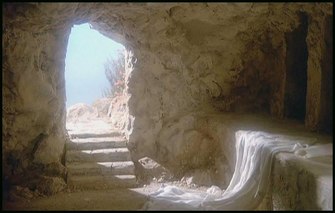 Photo Credit: Creative Commons - missionhelpers.org
Photo Credit: Creative Commons - missionhelpers.org
Leviticus 16:6-10, 34 NIV “Aaron is to offer the bull for his own sin offering to make atonement for himself and his household. Then he is to take the two goats and present them before the Lord at the entrance to the tent of meeting. He is to cast lots for the two goats—one lot for the Lord and the other for the scapegoat. Aaron shall bring the goat whose lot falls to the Lord and sacrifice it for a sin offering. But the goat chosen by lot as the scapegoat shall be presented alive before the Lord to be used for making atonement by sending it into the wilderness as a scapegoat. “This is to be a lasting ordinance for you: Atonement is to be made once a year for all the sins of the Israelites.” And it was done, as the Lord commanded Moses.
I have often said that Jesus’ resurrection was the proof that the Father had accepted His sacrifice as the last one needed to cover mankind’s sin. Jesus was the last sin offering and the last scapegoat. Although the Holy Spirit had made this crystal clear to me I had never been able to explain it to others in a way that was clear and concise.
I know that Resurrection Day (Easter), is long past, this year but I need to share what I read in my quiet time.
 Photo Credit: Creative Commons - Pittsburgh Symphony Orchestra
Photo Credit: Creative Commons - Pittsburgh Symphony Orchestra
No Salvation Without The Resurrection
Excerpts from "Death Is Dead, Christ Has Conquered" by Sam Allberry
Too many of us view the resurrection of Jesus similarly—as little more than a nice, happy conclusion to the gospel story. As if after all the darkness of the betrayal, denial, and death, Spielberg was brought in to do the ending. Somewhere in the background a lavish sunset blazes away.
But the Easter story isn’t just “what happens next” to Jesus after his death. It doesn’t just wrap up the story; it fulfills it. In fact, there really is no story without it. It’s not just a matter of chronology but theology—vital, glorious theology. Without it we have nothing, and are nothing. The resurrection saves us. Good Friday is no good at all without Easter Sunday.
The resurrection doesn’t just wrap up the story; it fulfills it. Good Friday is no good at all without Easter Sunday.
No Resurrection, No Salvation
Paul reveals the necessity of Easter in a striking way: “He was delivered over to death for our sins and was raised to life for our justification” (Rom. 4:25).
He connects the resurrection to our justification. He’s not saying we’re half-saved by the cross and half-saved by the resurrection. But he is saying without the resurrection, we are lost. No resurrection means no justification: “If Christ has not been raised, your faith is futile; you are still in your sins” (1 Cor. 15:17).
If Jesus is dead, our sin debt remains unpaid, and we remain under sin’s dominion. If there was no Easter life for Jesus, there is no new life for us. The blood of Jesus saves us because he is now alive.
But why exactly do we need the resurrection for these things to be certain? The wider story of the Bible shows us. The raising of Jesus from death is significant because death is significant. Only when we understand what death means will we be able to grasp what Easter means.
Sin Births Death
Death is the consequence of sin. Adam was told this as far back as Genesis 2—eat of the tree of the knowledge of good and evil and “you will surely die” (Gen. 2:16–17). God is life, so turning from him is fatal. Sin both earns death (Rom. 6:23) and births death (James 1:15). Death is what sin chooses, what sin receives, and what sin deserves.
This accounts for why we have such a strange perception of death. Death is, when we think about it, one of the most normal things about life in this world, as sure as our birth. Yet we can’t reconcile ourselves to this reality. Death never really feels natural. It feels wrong. So we put huge effort into living as though death is not going to happen.
Our unease with death indicates we know perhaps more than we realize. Death (like sin) does not belong here. It’s something we were’t meant to experience. But sin leads to death, and so the existence of death proves the reality of sin.
Closed Deal
As we grasp the significance of death, we can start to see the significance of resurrection. Raising Jesus from the dead was not an arbitrary stunt by God the Father. It wasn’t just a mega-miracle to prove he’s still there and still bigger—though that is true. No, the resurrection has meaning. The resurrection is the outworking and proof of our salvation because death is the outworking and proof of our sin. Jesus’s new life shows us the cycle of sin and death has finally been broken. There is new life to be had. Sin has been conquered.
It is therefore the resurrection of Jesus—and can only be the resurrection of Jesus—that assures us of salvation. Only the resurrection proves that our sins have been fully dealt with, that death is no longer our destination but a gateway to perfect, endless life.
The cross is not a starter pack. God doesn’t drum up most of what we need only to leave us fishing around in our pockets to provide the rest.
By dying and rising for us, the Son has closed the deal. In raising him from the dead, the Father has signed for it.
This article originally appeared on TheGospelCoalition.org. Used with permission.

 RSS Feed
RSS Feed